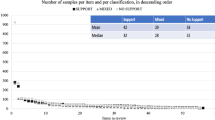Abstract
In this paper, I lend novel support to H. P. Grice’s account of speaker meaning (GASM) by blunting the force of a significant objection. Stephen Schiffer has argued that in order to make GASM sufficient, one must add restrictions that are psychologically impossible to fulfill, thereby making GASM untenable. In what follows, I explain the elements of GASM that require it to invoke these psychologically unrealizable restrictions. I then accept Schiffer’s criticism, but modify its significance to GASM. I argue that the problem that Schiffer notes is not a reason to reject GASM, but a reason to embrace it. GASM shows that meaning is best understood as an absolute concept—an unrealizable ideal limit. Taking some inspiration from contextualist theories of knowledge attribution, I argue that my version of GASM offers a useful contextualist account of meaning attribution. Hence, pragmatic theories of meaning and communication should not wholly exclude GASM from their theorizing, at least not for the reasons that are commonly given.
Similar content being viewed by others
References
Avramides A. (1989). Meaning and mind: An examination of a Gricean account of language. Cambridge, MIT Press
DeRose K. (1992). Contextualism and knowledge attributions. Philosophy and Phenomenological Research 52, 913–929
Grice H.P. (1957). Meaning. In: Grice H.P. (Ed). (1989), Studies in the way of words (pp. 213–223). Cambridge: Harvard University Press.
Grice, H. P. (1969). Utterer’s meaning and intentions. In H. P. Grice (Ed.), (1989), Studies in the way of words (pp. 86–116). Cambridge: Harvard University Press.
Grice, H. P. (1975). Logic and conversation. In H. P. Grice (Ed.). (1989), Studies in the way of words (pp. 22–40). Cambridge: Harvard University Press.
Grice, H. P. (1982). Meaning revisited. In H. P. Grice (Ed.). (1989), Studies in the way of words (pp. 283–303). Cambridge: Harvard University Press.
Lewis, D. (1983). Scorekeeping in a language game. In D. Lewis (Ed.). (1983), Philosophical papers, (Vol. I, pp. 233–249). Oxford: Oxford University Press.
Recanati F. (1986). On defining communicative intentions. Mind and Language 1(3): 213–242
Saul J. (2002a). Speaker meaning, what is said, and what is implicated. Nous 36(2): 228–248
Saul J. (2002b). What is said and psychological reality: Grice’s Project and relevance theorists’ criticisms. Linguistics and Philosophy 25, 347–372
Schiffer S. (1972). Meaning. Oxford, Oxford University Press
Schiffer S. (1981). Intention-based semantics. Notre Dame Journal of Formal Logic 23, 119–156
Schiffer S. (1987). Remnants of meaning. Cambridge, MIT Press
Sperber D., Wilson D. (1995). Relevance: Communication and cognition (2nd ed). Cambridge, Blackwell
Strawson P.F. (1964). Intention and convention in speech acts. The Philosophical Review 73(4): 439–460
Unger P. (1971). A defense of skepticism. The Philosophical Review 80(2): 198–219
Wilson, D. (2000). Metarepresentation in linguistic communication. In D. Sperber (Ed.). (2000), Metarepresentations. Oxford: Oxford University Press.
Author information
Authors and Affiliations
Corresponding author
Rights and permissions
About this article
Cite this article
Thompson, J.R. Grades of meaning. Synthese 161, 283–308 (2008). https://doi.org/10.1007/s11229-007-9161-1
Received:
Accepted:
Published:
Issue Date:
DOI: https://doi.org/10.1007/s11229-007-9161-1




